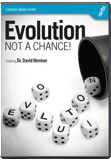
Are Scientists Really Biased by their Presuppositions?
Presuppositions are things you take for granted: like your own existence, the reliability of your memory, your continued personal identity, moral laws, laws of logic, induction, and many others.
In an article on your site, the author says, “The difference is in the way we all interpret the facts. And why do we interpret facts differently? Because we start with different presuppositions.”
This “author” continues to throw around the word presuppositions. Please, enlighten me, on what axioms does modern science exist upon? I’m aware of mathematical axioms, but never have I even heard anything resembling scientific axioms. What does science “assume” to be true?
Any time I question a religious person about this, they fail to respond with a credible answer. Biologists do examine evidence, however there is no room for interpretation. You can NOT say that carbon dating is based on an axiom...it is not. Are you the same people who believe the earth is flat?
Choke and die on your bibles already.
—S.J., U.S.
In an article on your site, the author says, “The difference is in the way we all interpret the facts. And why do we interpret facts differently? Because we start with different presuppositions.”
The article is right. Presuppositions are our most basic assumptions about the world. Presuppositions are things you take for granted: like your own existence, the reliability of your memory, your continued personal identity, moral laws, laws of logic, induction, and many others. Most people assume all of these things, but they don’t stop to think about why they assume these things. All the above presuppositions make sense in a Christian worldview, but are problematic in non-Christian worldviews. We’ll see some examples of this below.
This “author” continues to throw around the word presuppositions. Please, enlighten me, on what axioms does modern science exist upon?
Science actually rests on a large number of critical presuppositions/axioms. In addition to those listed above, one must assume that his or her senses are reliable. What good would it be to do an experiment if my eyes do not accurately relate to me the results of that experiment? And what good would it be to have accurate eyes if light traveled erratically? We presuppose that light travels in an orderly way. What good would it be to do any experiment if the universe did not behave in an organized, logical fashion? We presuppose the universe continually behaves in an orderly, logical way. Hopefully, you’re now beginning to see just a few of the presuppositions that are rationally necessary for science to be possible.
A trustworthy God
Thank you for your messages on the truth of creation. Although I went to a Christian college and was pretty grounded all my life in creation teachings, a lot of evolution-based ideology permeated much of my early adult life, especially since not all my Bible professors subscribed to 6 literal days of creation. It was only later, as I was reading Genesis, and kept stumbling across the phrase “evening and morning” that my eyes finally began to open. I love your ministry and I especially exult in the fact that our God is a God who can be investigated, and proven trustworthy.
Keep up the amazingly good work!
—L.R., U.S.
I’m aware of mathematical axioms, but never have I even heard anything resembling scientific axioms. What does science “assume” to be true?
You’ve found one example yourself. Many areas of science are mathematical in nature, and thus rely on mathematical axioms. But let me give another example: science requires induction. Suppose I set up an experiment and get a certain result. I expect that if I set up an identical experiment under identical conditions in the future I will get an identical result. But why should that be? Most people don’t stop to think about this; they just take it for granted. Why should it be that the future reflects the past in this way? In the Christian worldview, induction makes sense. God (who is beyond time) upholds the universe in a uniform way, and has told us that we can count on certain things in the future (Genesis 8:22). So, I’d expect to get an identical result to an identical future experiment, since God upholds the future universe in the same way He upheld the past universe.
But apart from the Bible, why should we assume that the future reflects the past? Since we’re all made in God’s image, we instinctively rely on induction. But how can a non-Christian assume that the future will reflect the past in his worldview? He might say, “Well it always has,” but this doesn’t in any way mean that it likely will continue to be that way in the future unless we already knew that the future reflects the past. In other words, when a person says, “Well, in the past the future has reflected the past, so I’d expect that in the future, the future will reflect the past,” he’s using a circular argument. (Think about it.) He’s assumed induction to prove induction. This is “begging the question” and isn’t rational.
Any time I question a religious person about this, they fail to respond with a credible answer.
Ironically, only the Christian can provide a rational explanation for the presuppositions necessary for science. A logical, orderly universe, a rational mind, reliable senses, mathematical axioms, induction, and logical laws are just a few of the presuppositions required by science that are provided by the Christian worldview, but which have no foundation in an evolutionary worldview.
Biologists do examine evidence, however there is no room for interpretation.
This isn’t realistic, and it’s just not how science is done. By examining evidence, the biologist has already presupposed that, at the very least, his senses are reliable. This presupposition would be held by essentially all scientists; otherwise, they wouldn’t be able to do science. Scientists have to interpret the data.
The evolutionary biologist and creation biologist have different presuppositions regarding earth’s history. Therefore, they draw different conclusions when examining the same evidence. But which is a better scientific mindset? Consider the examples ofvestigial organs and junk DNA. Secularists incorrectly assume that things are left over from the past, whereas creationists work from the presupposition that everything has (or had) a purpose.
You can NOT say that carbon dating is based on an axiom...it is not.
Carbon dating is based on all the above presuppositions (axioms) and many others. It presupposes (1) that C-14 decayed in the past as it does today; (2) that the C-14 in the atmosphere of the past was the same as today; (3) that the system is uncontaminated; (4) the laws of probability; and (5) the equivalence of C-14 atoms, as well as the more abstract presuppositions listed above—induction, reliability of the senses, and so on.
By the way, carbon dating provides powerful confirmation of the biblical timescale. Scientists have found C-14 in coal and diamonds that are supposedly millions of years old (or over a billion years old for the diamonds) in the evolutionary view. But C-14 has a half life of around 5,700 years—it decays to the point that it can’t be detected before even one million years have passed. Do you suppose that evolutionists are convinced by such evidence that the earth really is just a few thousand years old as the Bible teaches? Or do they simply dismiss such evidence and assume that there must be some sort of contamination (despite the lack of evidence of contamination) simply because of their presupposition that the earth is billions of years old or dismiss the credibility of the scientists involved without really addressing the issue at hand?
Clearly, presuppositions vastly affect our interpretation of evidence. The problem (for the secular scientist) is that science itself is based on Christian presuppositions. Science is possible because God upholds the universe in a logical, orderly way and because God made our minds able to think and reason logically and made our senses able to perceive the universe.
Are you the same people who believe the earth is flat?
No, we believe the Bible, which indicated that the earth was round in passages like Isaiah 40:22 and Job 26:10 long before we had a way of seeing it. Have you actually read the Bible?
Choke and die on your bibles already.
The above statement is a great example of how objections to biblical creation are ultimately subjective and emotional in nature—not logically rational.
Jason Lisle, Ph.D.
Recommended Resources

Answers in Genesis is an apologetics ministry, dedicated to helping Christians defend their faith and proclaim the good news of Jesus Christ.
- Customer Service 800.778.3390
- © 2024 Answers in Genesis






